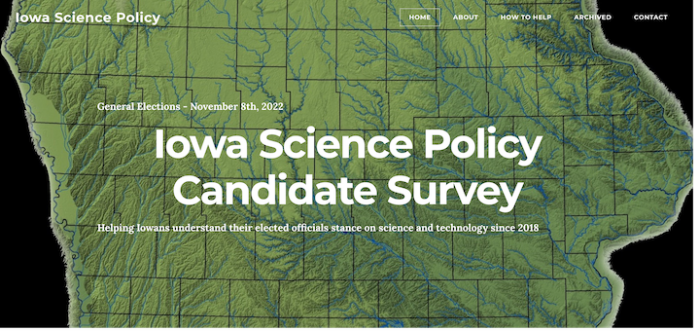Dan Chibnall, Annabelle Lolinco, and Riley Troyer co-authored this post.
Chuck Grassley, a Republican seeking an eighth term in the U.S. Senate, is concerned that science is becoming politicized, but fears any official responsible for stopping it could become politicized themselves.
Michael Franken, Grassley’s Democratic challenger, says the government should dismantle giant agricultural monopolies and promote regional food hubs to make Iowa farms more sustainable.
John Norwood, Democratic nominee for Iowa Secretary of Agriculture, says sequestering carbon in the soil could boost farmers’ incomes while improving soil productivity and reducing flooding.
Cindy Golding, the Republican candidate for Iowa House district 83 in eastern Linn County, says before authorities can determine a vaccine should be mandatory, unbiased, peer-reviewed research must answer questions regarding its safety, efficacy and other qualities.
Rick Stewart, the Libertarian nominee for governor, says politicians should get out of the energy business and let the free market determine the role biofuels play in the state’s energy portfolio.
They and others seeking office in the November 8 election responded to a questionnaire that puts candidates on the record regarding science, science-related policy and evidence-based decision-making.
The Iowa Science Policy Candidate Survey, iowasciencepolicy.weebly.com, injects research and science into campaigns, ensuring these vital subjects get a hearing. Candidates often advocate policies based on their party’s economic or ideological principles, but rarely publicly weigh the consensus of scientists and researchers. Rather than rationally considering proposed laws, politicians seek selective evidence to support their views and fudge the facts.
Voters deserve to know if and how politicians will use sound research to address such key issues as climate change, groundwater pollution, and public health. Our coalition of more than a dozen Iowa science, agricultural, health and environmental organizations believe science in the public interest, publicly supported research, and laws and regulations grounded in peer-reviewed evidence will improve life for Iowans.
The Iowa Science Policy Candidate Survey gives voters a single location to find contenders’ views on the climate change, science-based decision-making, vaccinations, and more. Our nonpartisan coalition sent the survey to all nominees for federal, statewide and legislative offices—more than 200 altogether. We’re publishing the answers without editing, comments or endorsements at iowasciencepolicy.weebly.com.
Getting so many officeholders and would-be officeholders on the record is difficult. If statewide candidates or those running from your area haven’t responded, we hope you’ll urge them to reply. You can find their email addresses and telephone numbers on the website.
Science Iowa and two student groups—Iowa State University’s Advocating Science Policy in Research and Education (ASPIRE) and the University of Iowa’s Connecting Science to Society (CSTS)—led the coalition of Iowa organizations. ASPIRE and CSTS are chapters of the National Science Policy Network (NSPN), a nonprofit that encourages early-career scientists to engage in science policy, advocacy and diplomacy.
NSPN is supporting similar surveys around the country. Because this is the third questionnaire Science Iowa has developed and the second involving ASPIRE, CSTS and the other organizations, NSPN often cites our effort as an example.
Besides Science Iowa, ASPIRE and CSTS, partner organizations that provided input to the survey include:
· Iowa Environmental Council
· Conservation Districts of Iowa
· Iowa Public Health Association
· Sustainable Iowa Land Trust
· Citizens’ Climate Lobby – Des Moines Chapter
· Citizens’ Climate Lobby – Iowa Great Lakes Chapter
· Drake Environmental Action League
· Society of Physics Students, University of Iowa
· Sustainable Agriculture Student Association, Iowa State University
· Iowa State Society for Advancement of Chicanos/Hispanics and Native Americans in Science
· Science for the People, Iowa State University
Together, these associations represent thousands of Iowans. They and every citizen deserve to know how elected representatives will use science to improve their lives and the lives of generations to come.
Science Iowa President Dan Chibnall is the STEM Librarian & Associate Professor of Librarianship at Drake University.
Annabelle Lolinco is a Ph.D. candidate at Iowa State University studying student learning of chemistry in context. She is the co-founder and president of Advocating Science Policy in Research and Education, Iowa State University’s National Science Policy Network student chapter.
Riley Troyer is a graduate student at the University of Iowa studying the northern lights. He is also the co-founder and President of Connecting Science to Society, the University of Iowa’s National Science Policy Network student chapter.
Editor’s note: Bleeding Heartland welcomes guest posts about the 2022 general election, including articles about where candidates stand on issues of local, state, or national importance. Please reach out to Laura Belin if you are interested in writing.

